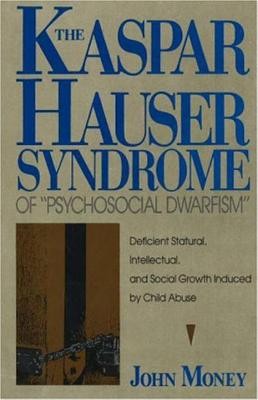
- Išsiųsime per 10–14 d.d.
- Autorius: John Money
- Leidėjas: Prometheus Books
- ISBN-10: 087975754X
- ISBN-13: 9780879757540
- Formatas: 16.3 x 23.8 x 2.6 cm, kieti viršeliai
- Kalba: Anglų
- Extra -15 % nuolaida šiai knygai su kodu: ENG15
Atsiliepimai
Aprašymas
A century's worth of information on the physical, social, and mental effects of child abuse and neglect is gathered together in this extraordinary study. John Money adopts the historical figure of Kaspar Hauser as the paradigm case of abusive neglect and deprivation that have typified reports of child abuse for more than a century.Hauser was a physically stunted adult with the mind of a child, who was abandoned at the city gate of Nuremburg in 1828, after seventeen years of neglect and isolation in a dungeon. The notoriety of his case gave the impetus to many learned arguments regarding the significance of nature versus nurture. Money summarizes the various incorrect theories that have been advanced since Hauser's time by pediatricians, psychologists, and psychiatrists. He underscores recent studies showing that depriviation drastically impairs the normal functioning of growth hormones, thus causing physical dwarfism, mental retardation, and defective social development. He shows how children from abusive environments can be effectively treated by a move to a new home and affectionate stimulation of the skin senses. Data collected on more than thirty modern cases of the Kaspar Hauser syndrome are presented to support Money's arguments.
This groundbreaking work concludes with a review by Joshua Kendall of the Kaspar Hauser figure in nineteenth and twentieth century poetry, prose, and drama. We see how various artists have used the image of Kasper Hauser as a potent and haunting symbol of our troubled modern society.
EXTRA 15 % nuolaida su kodu: ENG15
Akcija baigiasi už 2d.19:31:49
Nuolaidos kodas galioja perkant nuo 10 €. Nuolaidos nesumuojamos.

- Autorius: John Money
- Leidėjas: Prometheus Books
- ISBN-10: 087975754X
- ISBN-13: 9780879757540
- Formatas: 16.3 x 23.8 x 2.6 cm, kieti viršeliai
- Kalba: Anglų
Hauser was a physically stunted adult with the mind of a child, who was abandoned at the city gate of Nuremburg in 1828, after seventeen years of neglect and isolation in a dungeon. The notoriety of his case gave the impetus to many learned arguments regarding the significance of nature versus nurture. Money summarizes the various incorrect theories that have been advanced since Hauser's time by pediatricians, psychologists, and psychiatrists. He underscores recent studies showing that depriviation drastically impairs the normal functioning of growth hormones, thus causing physical dwarfism, mental retardation, and defective social development. He shows how children from abusive environments can be effectively treated by a move to a new home and affectionate stimulation of the skin senses. Data collected on more than thirty modern cases of the Kaspar Hauser syndrome are presented to support Money's arguments.
This groundbreaking work concludes with a review by Joshua Kendall of the Kaspar Hauser figure in nineteenth and twentieth century poetry, prose, and drama. We see how various artists have used the image of Kasper Hauser as a potent and haunting symbol of our troubled modern society.




Atsiliepimai